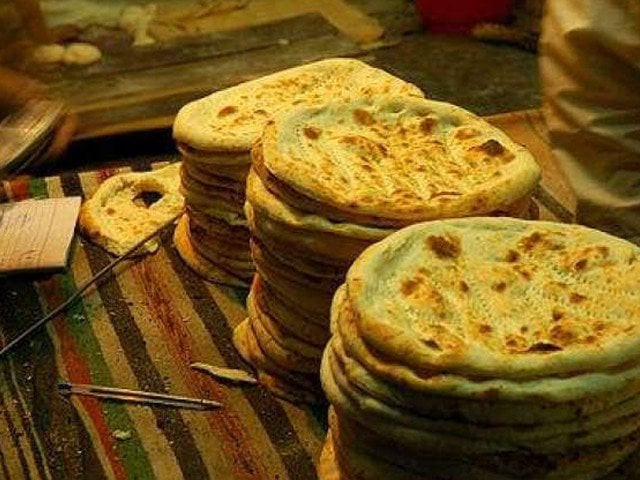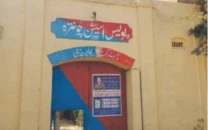Govt withdraws hike in gas prices for tandoors
Vendors had started selling naan in the range of Rs12 to Rs15 in different cities – up from Rs10

A subsidy of Rs1.51 billion will be provided by the government for the gas connections for the ovens PHOTO: EXPRESS
The Economic Coordination Committee (ECC) of the cabinet decided to give over Rs1 billion subsidy to Sui Sothern Gas Company Limited and Sui Northern Gas Pipeline Limited to compensate them for the losses that these utility companies will bear due to reducing gas sale rates.
The ECC also imposed 10% import taxes on import of cotton to ensure better prices to the farmers, although the country is facing shortage of the cotton – the key input of the textile sector.
The ECC decided to restore gas prices for tandoors to June 30, 2019 level in the larger interest of the general public, according to a handout issued by the Ministry of Finance after the meeting. Before increase in gas prices, per unit price for tandoors was Rs700, which the PTI government increased to Rs1,283 from July.
The step to reverse the prices has been taken to stop the tandoorwalas from increasing the prices of roti and naan. The vendors had started selling the naan in the range of Rs12 to Rs15 in different cities of the country –up from Rs10. Similarly, roti is available at Rs10 to Rs12, while its previous rate was Rs7 to Rs8.
The decision was taken despite the fact that price of wheat which contributes 55% to 60% to the price of roti had remained unchanged, while the gas bills that contribute 20% to 25 % to the price of roti, had also not been issued yet under the new tariff having come into effect from July 1 2019, said the Ministry of Finance.
A detailed survey of the tandoors would be carried out in order to ensure that the benefit of revision in gas tariff was made applicable to stand-alone tandoors or roadside restaurants catering to the poor and no undue benefit was passed on to the tandoors in hotels or larger restaurants which were to be treated as commercial gas connections.
The ECC meeting also called for effective price control by provincial governments and relevant authorities to ensure the sale of roti at its old price and decided to review the decision after three months in case the tandoor owners failed to pass the benefit of reduced gas prices to the common man.
Wheat situation
A Report on Wheat Situation in the country was also presented to the ECC. The meeting was briefed that there were 7.635 million tons of wheat stocks available with PASSCO and provincial food departments. There was a reduction of 3.74 million metric tons or 33% as compared to the corresponding period last year.
It was also mentioned during the meeting that after the imposition of the ban on the export of wheat and wheat flour, there had been a considerable reduction in wheat prices in the market and the situation would eventually reduce the prices of roti and naan in the market.
The wheat prices had also gone up by Rs150 per 40 kilogram, which slightly reverted this week after introduction of ban on exports.
The ECC was informed that only 4.03 million metric tons of wheat could be procured from the farmers this year, missing the production target 6.25 million metric tons by 35%. The Sindh Food Department did not procure wheat.
Despite reduction in both stocks and missing the procurement target, Pakistan exported 550,000 metric tons of wheat and its products in last fiscal year.
The ECC did not take immediate steps to check hoarding and smuggling of wheat but decided to hold National Price Monitoring Committee meeting on August 8.
The price control committee will suggest measures to mitigate the price hike trend in the domestic markets. The prices in local markets are significantly higher than the international market prices.
However, the National Price Monitoring Committee does not have teeth to enforce its decisions and it is only a consultative body.
Cotton import taxes
The ECC decided to impose 10% custom duties and sales tax on the import of cotton. A 3% custom duty, 2% additional custom duty and 5% sales tax will be reintroduced from Thursday (today).
The decision has been taken to encourage the farmers to grow cotton to meet this year's ambitious production target of 13.45 million bales. The cotton production and cultivation area both declined in the last fiscal year, which led to imports during January-June this year.
The cotton production in the last fiscal year declined 16% to 9.9 million bales and yet the government took the decision to impose duties to provide protection to the farmers. The cotton prices marginally decreased from Rs9,410 per maund to Rs9,241 in March 2019, according to the Ministry of National Food Security.
RLNG
The ECC also allowed the two LNG re-gasification terminals (Engro Elengy Terminal Private Limited and Pakistan Gas Port Consortium Limited) to allocate additional regasification capacity of terminal, if any, to third parties on a commercial basis under mutually agreed arrangements subject to certain conditions.
The decision will help save the capacity charges that the government is paying to these two terminal owners. The Pakistan Gas Port Consortium Limited wants to sell its additional regasification capacity to M/s Tafigura, the ECC was informed.
Pakistan is importing 600 mmcfd LNG that is re-gasified and sold to the government. The regasification capacity of the Engro's terminal is 690 mmcfd and the Pakistan Gas Port terminal's capacity is 750 mmcfd. The SSGC is bound to lift 630 mmcfd gas from Engro terminal, while the Pakistan LNG Terminal Limited Company has contractual obligation to procure 600 mmcfd gas from Pakistan Gas Port Consortium.
CPPA agreement amendments
The ECC also approved the Authorization of CPPA to sign the interim agreement regarding revised payment terms for generation on LNG by Altern Energy Limited, Kot Addu Power Company Limited & Public sector Gencos and extension of Interim Agreement signed with Fauji Kabirwala and Rousch Power Limited expiring on June 30, 2018. The decision has been taken to ensure timely payments to the power producers and the LNG suppliers.



















COMMENTS
Comments are moderated and generally will be posted if they are on-topic and not abusive.
For more information, please see our Comments FAQ